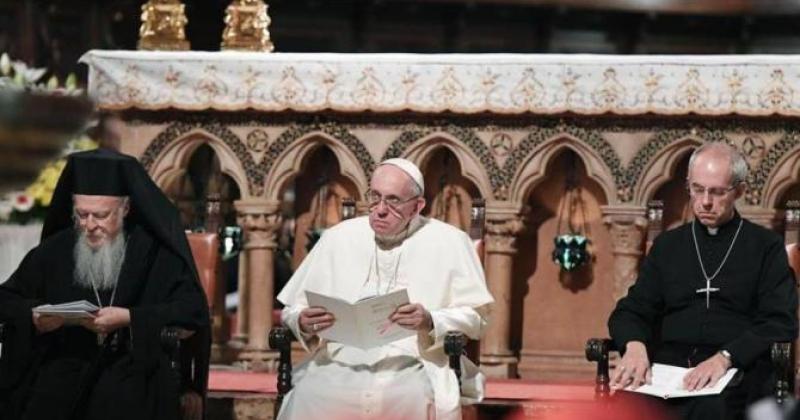Francis, Bartholomew and Welby meditate together during the ecumenical prayer session in the Lower Basilica of St. Francis of Assisi: “Who bothers responding to them? “Far too often they encounter the coldness of those who silence their cry for help with the same ease with which television channels are changed”
“The victims of war, which sullies people with hate and the earth with arms, plead for peace”. Pope Francis pronounced his own meditation during the ecumenical prayer of Christians in the Lower Basilica of St. Francis of Assisi. This was one of the moments when faithful of different religions prayed in separate groups, each according to their own tradition.
This was how the public part of the Pope’s visit to St. Francis’ birthplace began. Bergoglio arrived at 11:30 am, greeting each of the 200 participants of the round-table meetings organised by the Community of Sant’Egidio on the 30th anniversary of the meeting convened by John Paul II. Lunch was then served in the Franciscan convent, attended by 400 guests as well as some refugees. Those present celebrated the 25th anniversary of Bartholomew I’s election as Ecumenical Patriarch of Constantinople with a cake.
The Pope then held individual meetings with Bartholomew, the Syro-orthodox Patriarch of Antioch, Aphrem II, the Archbishop of Canterbury, Justin Welby, the philosopher Zygmut Bauman, the Chairman of the Indonesian Council of Ulema, Din Syansuddin and the Chief Rabbi David Rosen. He then joined Christians gathered in the Lower Basilica, for a session of common prayer.
Anglican Primate Justin Welby said: “We are living in a world that struggles to distinguish between the cost of something and the value of something… Let us take a look around Europe today,” “our economies may allow us to spend a lot but these foundations are made of nothing but sand. Despite it all, we have fallen prey to dissatisfaction and desperation: families are falling apart, there is hunger and inequality, people are turning to extremism”. “We need to listen to God” who often speaks to us “through the voice of the poorest and most uncared-for of people”.
In his own meditation, Patriarch Bartholomew said: “Marana-Tha – “Come Lord Jesus” – is the highest testimony of each Christian… and it rings our today more than ever in too many parts of the world, particularly in the Middle East. But in order for us too to cry out “Come Lord Jesus” along with our brothers and sisters who are thirsting for peace, as Churches we must undergo a metanoia, an intrinsic conversion, a radical change of mentality, a profound repentance and be able, as Christians, to put into practice what the Book of Revelation essentially asks of us: listening, conversion, prophetic testimony.”
Pope Francis then took the floor saying: “Jesus’ words challenge us, they seek a place in our heart and a response that involves our whole life. In his “I thirst” we can hear the voice of the suffering, the hidden cry of the little innocent ones to whom the light of this world is denied, the sorrowful plea of the poor and those most in need of peace. The victims of war, which sullies people with hate and the earth with arms, plead for peace; our brothers and sisters, who live under the threat of bombs and are forced to leave their homes into the unknown, stripped of everything, plead for peace. They are all brothers and sisters of the Crucified One, the little ones of his Kingdom, the wounded and parched members of his body. They thirst.”
“But,” he continued, “they are frequently given, like Jesus, the bitter vinegar of rejection. Who listens to them? Who bothers responding to them? Far too often they encounter the deafening silence of indifference, the selfishness of those annoyed at being pestered, the coldness of those who silence their cry for help with the same ease with which television channels are changed.”
“Before Christ Crucified, “the power and wisdom of God”, we Christians are called to contemplate the mystery of Love not loved and to pour out mercy upon the world… Drawing near to those living as crucified, and strengthened by the love of Jesus Crucified and Risen, may our harmony and communion deepen even more.”
During the prayer session, the names of 27 countries currently at war were read out. Straight after this, the Pope, along with the other Christian leaders made, their way up onto the stage in the square in front of the Lower Basilica, where representatives of other world religions also gathered for the concluding ceremony.”
